Throttle (Kindle Single) Read online
Page 2
Now Vince moved past the cored-out, red-eyed bunch, and took a stool at the counter beside Lemmy.
“What do you think we ought to do about this shit when we get to Vegas?” Vince asked.
“Run away,” Lemmy said. “Tell no one we’re going. Never look back.”
Vince laughed. Lemmy didn’t. He lifted his coffee halfway to his lips but didn’t drink, only looked at it for a few seconds and then put it down.
“Somethin’ wrong with that?” Vince asked.
“It ain’t the coffee that’s wrong.”
“You aren’t going to tell me you’re serious about taking off, are you?”
“We wouldn’t be the only ones, buddy,” Lemmy said. “What Roy did to that girl in the bathroom?”
“She almost shot him,” Vince said, voice low so no one else could hear.
“She wasn’t but seventeen.”
Vince did not reply and anyway no reply was expected.
“Most of these guys have never seen anything that heavy and I think a bunch—the smart ones—are going to scatter to the four corners of the earth as soon as they can. Find a new purpose for being.” Vince laughed again, but Lemmy only glanced at him sidelong. “Listen now, Cap. I killed my brother driving blind drunk when I was eighteen. And when I woke up I could smell his blood all over me. I tried to kill myself in the Corps to make up for it, but the boys in the black pajamas wouldn’t help me. And what I remember mostly about the war is the way my own feet smelled when they got jungle rot. Like carrying a toilet around in my boots. I been in jail, like you, and what was worst wasn’t the things I did or saw done. What was worst was the smell on everyone. Armpits and assholes. And that was all bad. But none of it has anything on the Charlie Manson shit we’re driving away from. Thing I can’t get away from is how it stank in the place. After it was over. Like being stuck in a closet where someone took a shit. Not enough air, and what there was wasn’t any good.” He paused, turned on his stool to look sidelong at Vince. “You know what I been thinking about ever since we drove away? Lon Refus moved out to Denver and opened a garage. He sent me a postcard of the Flatirons. I been wondering if he could use an old guy to twist a wrench for him. I been thinking I could get used to the smell of pines.”
He was quiet again, then shifted his gaze to look at the other men in their booths. “The half that doesn’t take a walk will be looking to get back what they lost, one way or another, and you don’t want any part of how they’re going to do it. ’Cause there’s going to be more of this crazy meth shit. This is just beginning. The tollbooth where you get on the turnpike. There’s too much money in it to quit, and everyone who sells it does it too, and the ones who do it make big fucking messes. The girl who tried to shoot Roy was on it, which is why she tried to kill him, and Roy is on it himself, which is why he had to whack her forty fucking times with his asshole machete. Who the fuck besides a meth-head carries a machete, anyhow?”
“Don’t get me started on Roy. I’d like to stick Little Boy up his ass and watch the light shoot out his eyes,” Vince told him, and it was Lemmy’s turn to laugh then. Coming up with deranged uses for Little Boy was one of the running jokes between them. Vince said, “Go on. Say your say. You been thinkin’ about it the last hour.”
“How would you know that?”
“You think I don’t know what it means when I see you sittin’ straight up on your sled?”
Lemmy grunted and said, “Sooner or later the cops are going to land on Roy or one of these other crankies and they’ll take everyone around them down with them. Because Roy and the guys like him aren’t smart enough to get rid of the shit they stole from crime scenes. None of them are smart enough not to brag to their girlfriends about what they been up to. Hell. Half of them are carrying rock right now. All I’m saying.”
Vince scrubbed a hand along the side of his beard. “You keep talking about the two halves, the half that’s going to take off and the half that isn’t. You want to tell me which half Race is in?”
Lemmy turned his head and grinned unhappily, showing the chip in his tooth again. “You need to ask?”
The truck with LAUGHLIN on the side was laboring uphill when they caught up to it around three in the afternoon.
The highway wound its lazy way up a long grade, through a series of switchbacks. With all the curves there was no obvious place to pass. Race was out front again. After they departed from the diner, he had sped off, increasing his lead on the rest of The Tribe by so much that sometimes Vince lost sight of him altogether. But when they reached the truck, his son was riding the guy’s bumper.
The ten of them rode up the hill in the rig’s boiling wake. Vince’s eyes began to tear and run.
“Fucking truck,” Vince screamed, and Lemmy nodded. Vince’s lungs were tight and his chest hurt from breathing its exhaust and it was hard to see. “Get your miserable fat-ass truck out of the way!” Vince hollered.
It was a surprise, catching up to the truck here. They weren’t that far from the diner . . . twenty miles, no more. LAUGHLIN must’ve pulled over somewhere else for a while—but there was nowhere else. Possibly he had parked his rig in the shade of a billboard for a siesta. Or threw a tire and needed to stop and put on a new one. Did it matter? It didn’t. Vince wasn’t even sure why it was on his mind, but it nagged.
Just past the next bend in the road, Race leaned his Softail Deuce into the lane for oncoming traffic, lowered his head, and accelerated from thirty to seventy. The bike squatted, then leaped. He cut in front of the truck as soon as he was ahead of it—slipping back into the right-hand lane just as a pale yellow Lexus blew past, going the other way. The driver of the Lexus pounded her horn, but the meep-meep sound of it was almost immediately lost in the overpowering wail of the truck’s air horn.
Vince had spotted the Lexus coming and for a moment had been sure he was about to see his son go head-on into it, Race one second, roadmeat the next. It took a few moments for his heart to come back down out of his throat.
“Fucking psycho,” Vince yelled at Lemmy.
“You mean the guy in the truck?” Lemmy hollered back, as the blast of the air horn finally died away. “Or Race?”
“Both!”
By the time the truck swung through the next curve, though, Laughlin seemed to have come to his senses, or had finally looked in the mirror and noticed the rest of The Tribe roaring along behind him. He put his hand out the window—that sundarkened and veiny hand, big-knuckled and blunt-fingered—and waved them by.
Immediately, Roy and two others swung out and thundered past. The rest went in twos. It was nothing to pass once the go-to was clear, the truck laboring along at barely thirty. Vince and Lemmy swept out last, passing just before the next switchback. Vince cast a look up toward the driver on their way by but could see nothing except that dark hand hanging out against the door. Five minutes later they had left the truck so far behind them they couldn’t hear it anymore.
There followed a stretch of high, open desert, sage and saguaro, cliffs off to the right, striped in chalky shades of yellow and red. They were riding into the sun now, pursued by their own lengthening shadows. Houses and a few trailers whipped by as they blew through a sorry excuse for a township. The bikes were strung out across almost half a mile, with Vince and Lemmy riding close to the back. But not far beyond the town, Vince saw the rest of The Tribe bunched up at the side of the road, just before a four-way intersection—the crossing for Route 6.
Beyond the intersection, to the west, the highway they had been following was torn down to dirt. A diamond-shaped orange sign read CONSTRUCTION NEXT 20 MILES BE PREPARED TO STOP. In the distance, Vince could see dump trucks and a grader. Men worked in clouds of red smoke, the clay stirred up and drifting across the tableland.
He hadn’t known there would be roadwork here, because they hadn’t come this way. It had been Race’s suggestion to return by the back roads, which had suited Vince fine. Driving away from a double homicide, it seemed like a good idea t
o keep a low profile. Of course that wasn’t why Race had suggested it.
“What?” Vince said, slowing and putting his foot down. As if he didn’t already know.
Race pointed away from the construction, down Route 6. “We go south on 6, we can pick up I-40.”
“In Show Low,” Vince said. “Why does this not surprise me?”
It was Roy Klowes spoke next. He jerked a thumb toward the dump trucks. “Bitch of a lot better than doing five an hour through that shit for twenty miles. No thank you. I’d rather ride easy and maybe pick up sixty grand along the way. That’s my think on it.”
“Did it hurt?” Lemmy asked Roy. “Having a thought? I hear it hurts the first time. Like when a chick gets her cherry popped.”
“Fuck you, Lemmy,” Roy said.
“When I want your think,” Vince said, “I’ll be sure to ask for it, Roy. But I wouldn’t hold your breath.”
Race spoke, his voice calm, reasonable. “We get to Show Low, you don’t have to stick around. Neither of you. No one’s going to hold it against you if you just want to ride on.”
So there it was.
Vince looked from face to face. The young men met his gaze. The older ones, the ones who had been riding with him for decades, did not.
“I’m glad to hear no one will hold it against me,” Vince said. “I was worried.”
A memory struck him then: riding with his son in a car at night, in the GTO, back in the days he was trying to go straight, be a family man for Mary. The details of the journey were lost now; he couldn’t recall where they were coming from or where they had been going. What he remembered was looking into the rearview mirror at his ten-year-old’s dusty, sullen face. They had stopped at a hamburger stand, but the kid didn’t want dinner, said he wasn’t hungry. The kid would only settle for a Popsicle, then bitched when Vince came back with lime instead of grape. He wouldn’t eat it, let the Popsicle melt on the leather. Finally, when they were twenty miles away from the hamburger stand, Race announced that his belly was growling.
Vince had looked into the rearview mirror and said, “You know, just because I’m your father doesn’t mean I got to like you.” And the boy had stared back, his chin dimpling, struggling not to cry, but unwilling to look away. Returning Vince’s look with bright, hating eyes. Why had Vince said that? The notion crossed his mind that if he had known some other way to talk to Race, there would’ve been no Fallujah and no dishonorable discharge for ditching his squad, taking off in a Humvee while mortars fell; there would’ve been no Dean Clarke and no meth lab and the boy would not feel the need to be out front all the time, blasting along at seventy on his hot-shit jackpuppy when the rest of them were doing sixty. It was him the kid was trying to leave behind. He had been trying all his life.
Vince squinted back the way they had come . . . and there was that goddamn truck again. Vince could see it through the trembling waves of heat on the road, so it seemed half-mirage, with its towering stacks and silver grille: LAUGHLIN. Or SLAUGHTERIN, if you were feeling Freudian. Vince frowned, distracted for a moment, wondering again how they had been able to catch up and pass a guy who’d had almost an hour lead on them.
When Doc spoke, his voice was almost shy with apology. “Might be the thing to do, boss. Sure would beat twenty miles of dirt bath.”
“Well. I wouldn’t want any of you to get dirty,” Vince said.
And he pushed away from the side of the road, throttled up, and turned left onto 6, leading them away toward Show Low.
Behind him, in the distance, he could hear the truck changing gears, the roar of the engine climbing in volume and force, whining faintly as it thundered across the plain.
The country was red and yellow stone, and they saw no one on the narrow, two-lane road. There was no breakdown lane. They crested a rise, then began to descend into a canyon’s slot, following the road as it wound steadily down. To the left was a battered guardrail, and to the right was an almost sheer face of rock.
For a while Vince rode out front beside Lemmy, but then Lemmy fell back and it was Race partnered beside him, the father and the son riding side by side, the wind rippling Race’s movie-star black hair back from his brow. The sun, now on the western side of the sky, burned in the lenses of the kid’s shades.
Vince watched him from the corners of his eyes for a moment. Race was sinewy and lean, and even the way he sat on his bike seemed an act of aggression, the way he slung it around the curves, tilting to a forty-five-degree angle over the blacktop. Vince envied him his natural athletic grace, and yet at the same time, somehow Race managed to make riding a motorcycle look like work. Whereas Vince himself had taken to it because it was the furthest thing from work. He wondered idly if Race was ever really at ease with himself and what he was doing.
Vince heard the grinding thunder of a big engine behind him and took a long, lazy look back over his shoulder just in time to see the truck come bearing down on them. Like a lion breaking cover at a watering hole where a bunch of gazelles were loafing. The Tribe was rolling in bunches, as always, doing maybe forty-five down the switchbacks, and the truck was rushing along at closer to sixty. Vince had time to think, He’s not slowing down, and then LAUGHLIN slammed through the three running at the back of the pack with an eardrum-stunning crash of steel on steel.
Bikes flew. One Harley was thrown into the rock wall, the rider—John Kidder, sometimes known as Baby John—catapulting off it, tossed into the stone, then rebounding and disappearing under the steel-belted tires of LAUGHLIN’s truck. Another rider (Doc, no, not Doc) was driven into the left lane. Vince had the briefest glance of Doc’s pale and astonished face, mouth opening in an O, the twinkle of the gold tooth he was so proud of. Wobbling out of control, Doc struck the guardrail and went over his handlebars, flung into space. His Harley flipped over after him, the hardcase breaking open and spilling laundry. The truck chewed up the fallen bikes. The big grille seemed to snarl.
Then Vince and Race swung around another hard curve side by side, leaving it all behind.
The blood surged to Vince’s heart, and for a moment there was a dangerous pinching in his chest. He had to fight for his next breath. The instant the carnage was out of sight, it was hard to believe it had really happened. Hard to believe the spinning bikes hadn’t taken out the speeding truck, too. Yet he had just finished coming around the bend when Doc crashed into the road ahead of them. His bike landed on top of his body with an echoing clang. His clothes came floating after. Doc’s sleeveless denim jacket came drifting down last, ballooning open, caught for a moment on an updraft. Over a silhouette of Vietnam in gold thread was the legend: WHEN I GET TO HEAVEN THEY’LL LET ME IN BECAUSE I’VE ALREADY BEEN TO HELL IRON TRIANGLE 1968. The clothes, the owner of the clothes, and the owner’s ride had dropped from the terrace above, falling seventy feet to the highway below.
Vince jerked the handlebars, swerving around the wreck with one boot heel skimming the patched asphalt. His friend of thirty years, Doc Regis, was now a six-letter word for lubricant: grease. He was facedown, but his teeth were glistening in a slick of blood next to his left ear, the goldie among them. His shins had come out through the backs of his legs, poles of shining red bone poking through his jeans. All this Vince saw in an instant, then wished he could un-see. The gag muscles fluttered in his throat and when he swallowed, there was a burning taste of bile.
Race swung around the other side of the ruin that had been Doc and Doc’s bike. He looked sideways at Vince, and while Vince could not see his eyes behind his shades, his face was a rigid, stricken thing . . . the expression of a small kid up past his bedtime who has walked in on his parents watching a grisly horror movie on DVD.
Vince looked back again and saw the remnants of The Tribe coming around the bend. Just seven now. The truck howled after, swinging around the curve so fast that the long tank it was hauling lurched hard to one side, coming perilously close to tipping, its tires smoking on the blacktop. Then it steadied and bore on, striking Ellis Harbison.
Ellis was launched straight up into the air, as if bounced off a diving board. He almost looked funny, pinwheeling his arms against the blue sky—at least until he came down and went under the truck. His ride turned end over end before being swatted entirely aside by the eighteen-wheeler.
Vince caught a jittery glimpse of Dean Carew as the truck caught up to him. The truck butted the rear tire of his bike. Dean high-sided and came down hard, rolling at fifty miles an hour along the highway, the asphalt peeling his skin away, his head bashing the road again and again, leaving a series of red punctuation marks on the chalkboard of the pavement.
An instant later the tanker ate Dean’s bike, bang, thump, crunch, and the lowrider Dean had still been making payments on exploded, a parachute of flame bursting open beneath the truck. Vince felt a wave of pressure and heat against his back, shoving him forward, threatening to lift him off the seat of his bike. He thought the truck itself would go up, slammed right off the road as the oil tanker detonated in a column of fire. But it didn’t. The rig came thundering through the flames, its sides streaked with soot and black smoke belching from its undercarriage, but otherwise undamaged and going faster than ever. Vince knew Macks were fast—the new ones had a 485 power plant under the hood—but this thing . . .
Supercharged? Could you supercharge a goddamn semi?
Vince was moving too fast, felt his front tire beginning to slurve about. They were close to the bottom of the slope now, where the road leveled out. Race was a little ahead. In his rearview he could see the only other survivors: Lemmy, Peaches, Roy. And the truck was closing in again.
They could beat it on a rise—in a heartbeat—but now there were no rises. Not for the next twenty miles, if his memory was right. It was going to get Peaches next, Peaches who was funniest when he was trying to be serious. Peaches threw a terrified glance back over his shoulder, and Vince knew what he was seeing: a chrome cliff. One that was moving in.

 The Fireman
The Fireman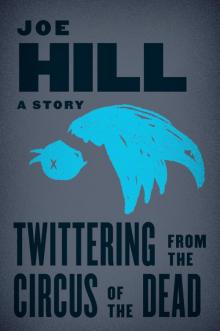 Twittering From the Circus of the Dead
Twittering From the Circus of the Dead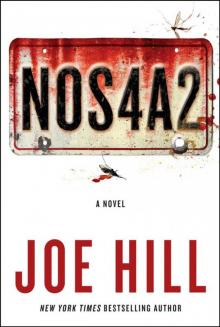 Nos4a2
Nos4a2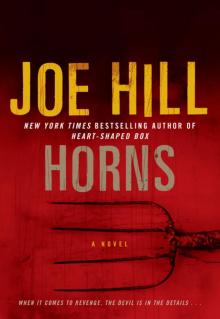 Horns
Horns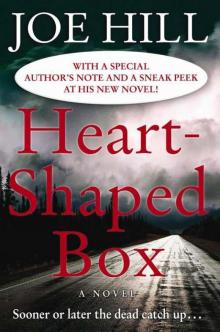 Heart-Shaped Box
Heart-Shaped Box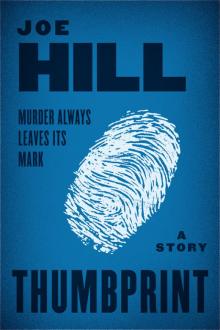 Thumbprint: A Story
Thumbprint: A Story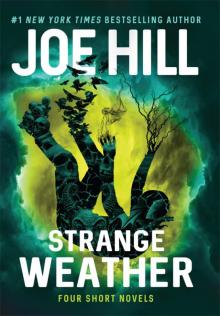 Strange Weather
Strange Weather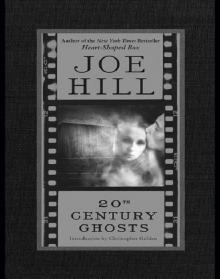 20th Century Ghosts
20th Century Ghosts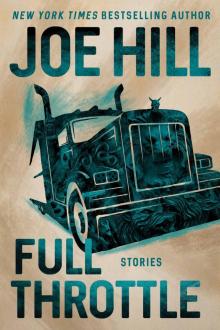 Full Throttle
Full Throttle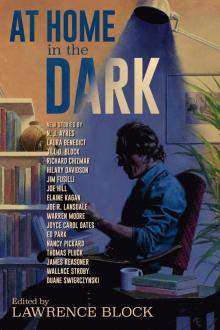 At Home in the Dark
At Home in the Dark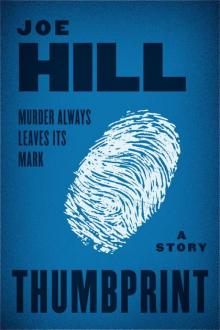 Thumbprint
Thumbprint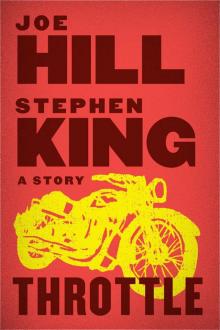 Throttle
Throttle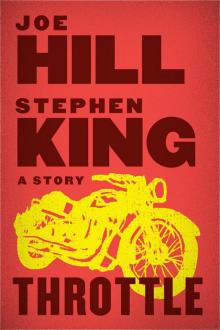 Throttle (Kindle Single)
Throttle (Kindle Single)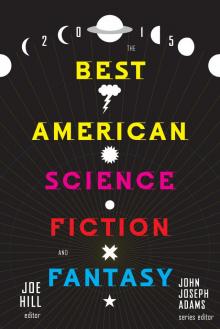 The Best American Science Fiction and Fantasy 2015
The Best American Science Fiction and Fantasy 2015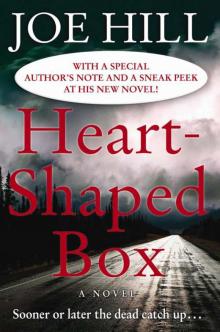 Heart-Shaped Box with Bonus Material
Heart-Shaped Box with Bonus Material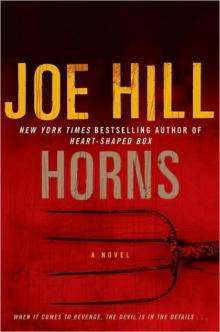 Horns: A Novel
Horns: A Novel